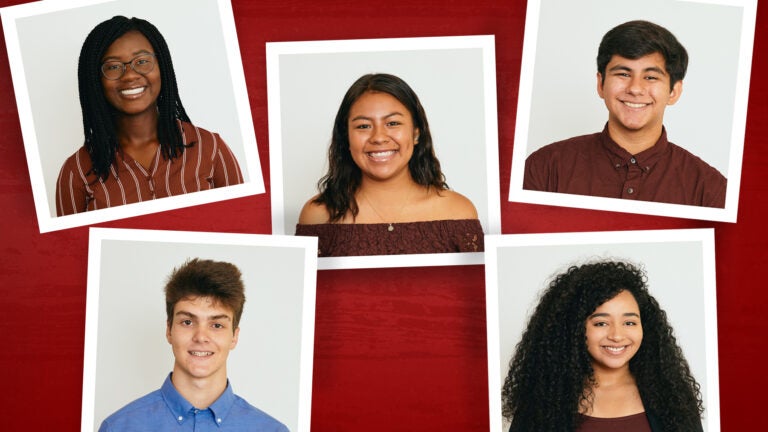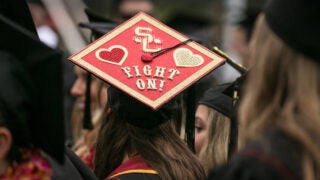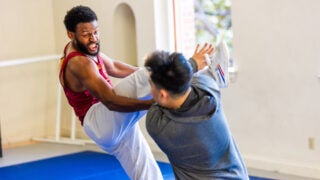
Thanks to the Bovard Scholars program, Ojuolape Ajose, Baudi Asuev, Maria Selene Castillo, Enrique Martinez and Rudalys Ruiz had their sights set on USC after spending time on campus as high schoolers. (Photos/Stella Kalinina)
Former Bovard Scholars share why they chose USC as their new home
Five participants in last year’s USC Bovard Scholars program explain why the three-week summer residency inspired them to commit to USC.
Earlier this summer, 119 high-achieving high school juniors with financial need arrived on the USC campus to begin a one-year program on their road to college. They started with an all-expenses-paid, three-week summer residency to help them earn a spot at one of the top colleges in the nation. And as that third cohort of the USC Bovard Scholars program arrived, another set of scholars from last year’s program were readying themselves for their next big chapter — starting freshman year, several right here at USC.
Maria Selene Castillo: ‘In my heart, I wanted to be a Trojan’
Maria Selene Castillo, for one, was already on campus as part of the Summer Bridge program that began in mid-June. A first-generation DACA student from Thermal, Calif., deep in the Coachella Valley, Castillo had no idea that programs like Bovard Scholars existed when she first dreamed of going to college.
“Coming from poverty, I didn’t know that people would pay for these program,” she said. “And I figured my parents wouldn’t be able to fund me. Being part of the Bovard Scholars program opened my eyes so much.”
During the three-week residency at the core of the Scholars program, Castillo — the 2019 valedictorian at Desert Mirage High School — learned just how much aid was out there for students without the means to pay for elite colleges. As acceptances rolled in — first from state schools including UCLA and University of California, Berkeley and finally USC — her emotions were mixed.
Being part of the Bovard Scholars program opened my eyes so much.
Maria Selene Castillo
“I didn’t know how much aid I was supposed to contribute, how much my parents were going to have to pay,” she said.
When Castillo checked online, both UCLA and USC — her top two choices — showed zero family contribution, which is not uncommon for Bovard Scholars; some 77% of the most recent cohort were awarded no-loan packages and scholarships covering full tuition. Even though her best friend was already at UCLA, she chose otherwise.
“In my heart, I wanted to be a Trojan,” she said. “I wanted to pave that way.”
Ojuolape Ajose: ‘I’ve always been someone who focused more on my major than what a name could do for me’
Castillo will be joined by Ojuolape Ajose from Grand Prairie, Texas, a suburb in the Dallas-Fort Worth area. Ajose, the youngest of seven, moved with her family from Nigeria when she was just a toddler. When she leaves Texas for USC, she will be the first in her family to attend an elite, out-of-state, private college.
Although Ajose’s passion has always been computer science, as a high school student she wasn’t sure what such a career choice would mean. “I thought, ‘I get my degree and then I … work at Google?’” she said. But the career exploration sessions at Bovard Scholars opened her eyes to the real and varied opportunities that lie ahead for computer science majors.
Accepted by nine of the 12 universities she applied to, including Yale University, Ajose chose the USC Viterbi School of Engineering.
“My family was sure I was going to pick Yale,” she said, “but I’ve always been someone who focused more on my major than what a name could do for me.” For one, the USC Viterbi computer science program would allow her to pursue business administration alongside computer science.
“[USC] also offers more clubs, a more diverse area, a more diverse student population,” she said. And as a Gates Scholarship recipient, Ajose felt financially able to go wherever she wanted.
Baudi Asuev: ‘One of the most important aspects is knowing where you’ll fit best’
For Baudi Asuev, who emigrated with his family from Russia to Prague before moving to the Denver suburb of Arvada, the Bovard Scholars program opened his eyes to attending schools outside of Colorado — and in-state tuition.
“Before Bovard, I didn’t know how affordable, how attainable those colleges were that I was applying to,” he said, highlighting one of the issues that the Bovard Scholars program tries to address — undermatching, where academically-motivated students don’t apply to top-tier universities at the same rate as their more affluent peers. “I learned that one of the most important aspects is knowing where you’ll fit best — where you’ll find success.”
For Asuev, that fit was USC over schools like Brown University and Columbia University — and financial aid truly made it possible. “My family and I never expected this much,” he said. “It put everything in perspective. My loans are minimal. The financial aid was just incredible. I’m so grateful.”
Enrique Martinez: ‘It showed what I’m capable of’
Each college counselor at Baldwin Park High School was responsible for hundreds of students, Enrique Martinez said. So when he first sat down one-on-one with his dedicated admissions counselor through Bovard Scholars, it was enlightening.
“It was the first time I really got to sit down and talk about my interests and create this plan,” he said. “I really appreciate how focused and how personal it was for me.”
The creative writing major was accepted at nine top-tier schools, including Brown and the University of Iowa. “It showed what I’m capable of, and it reinforced and reassured me about my own abilities going into college,” he said.
In the end, Martinez chose USC to stay close to his family and for the interdisciplinary education: “I’m excited to take classes across the school and to really be able to delve deeper into my own education.”
Rudalys Ruiz: ‘USC was the epitome of what I wanted’
USC had been Rudalys Ruiz’s dream school for as long as she can remember — so when she left her home in Lynn, Mass., to attend the three-week Bovard Scholars program last summer, she was surprised to be so scared.
“I was going all the way across the country, alone, to my dream school that I had never been to,” she said. “What if it wasn’t everything I’d wanted?”
But Ruiz didn’t have to worry. As a prospective global health major on a pre-med track, she quickly discovered it was a fit. “The health disparities [in downtown Los Angeles], the economic disparities, even the location brought so much opportunity for me,” she said. “USC was the epitome of what I wanted.”
I saw black and Hispanic women in STEM being engineers, doctors. That was the most powerful thing. I felt so much more hopeful.
Rudalys Ruiz
Ruiz was also struck by the people she met along the way — not just fellow scholars, with whom she stays in touch, but professionals and role models.
“It’s so difficult to find people of color, people who look like you or who have similar experiences, to be doctors, lawyers, businessmen and businesswomen,” she said. “I didn’t have anyone to look up to.”
The career panels and field trips that are part of Bovard Scholars changed that: “I saw black and Hispanic women in STEM being engineers, doctors. That was the most powerful thing. I felt so much more hopeful. I began to envision myself more clearly in my career. Before, it was a blur.”
“We designed Bovard Scholars not just to help low-income students get into top-tier schools, but to help them thrive once they are there,” said Anthony Bailey, founding dean of USC Bovard College and its signature program, Bovard Scholars. “That includes giving them exposure to professionals and experts in their fields and connect their academic pursuits to future careers.
“Whether they choose USC or another elite school, they are well-prepared to embrace the opportunities that will come to them for years to come.”



